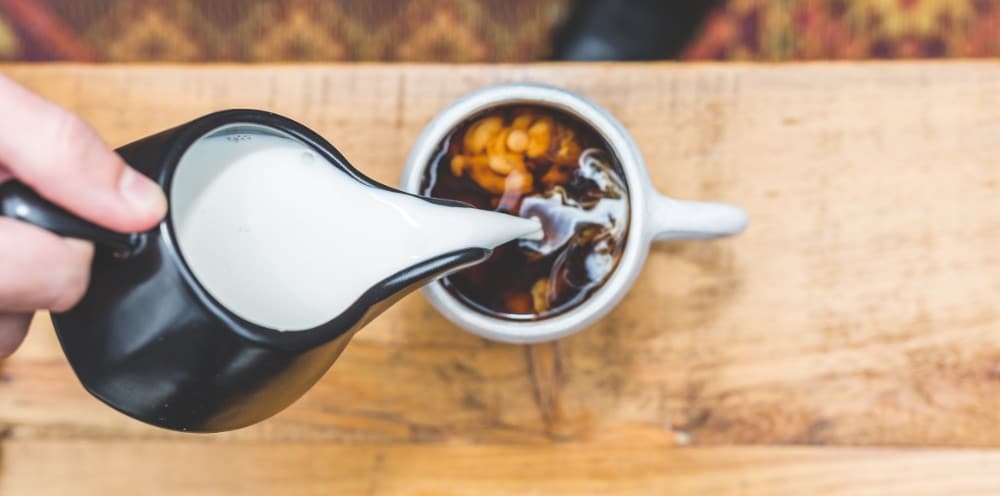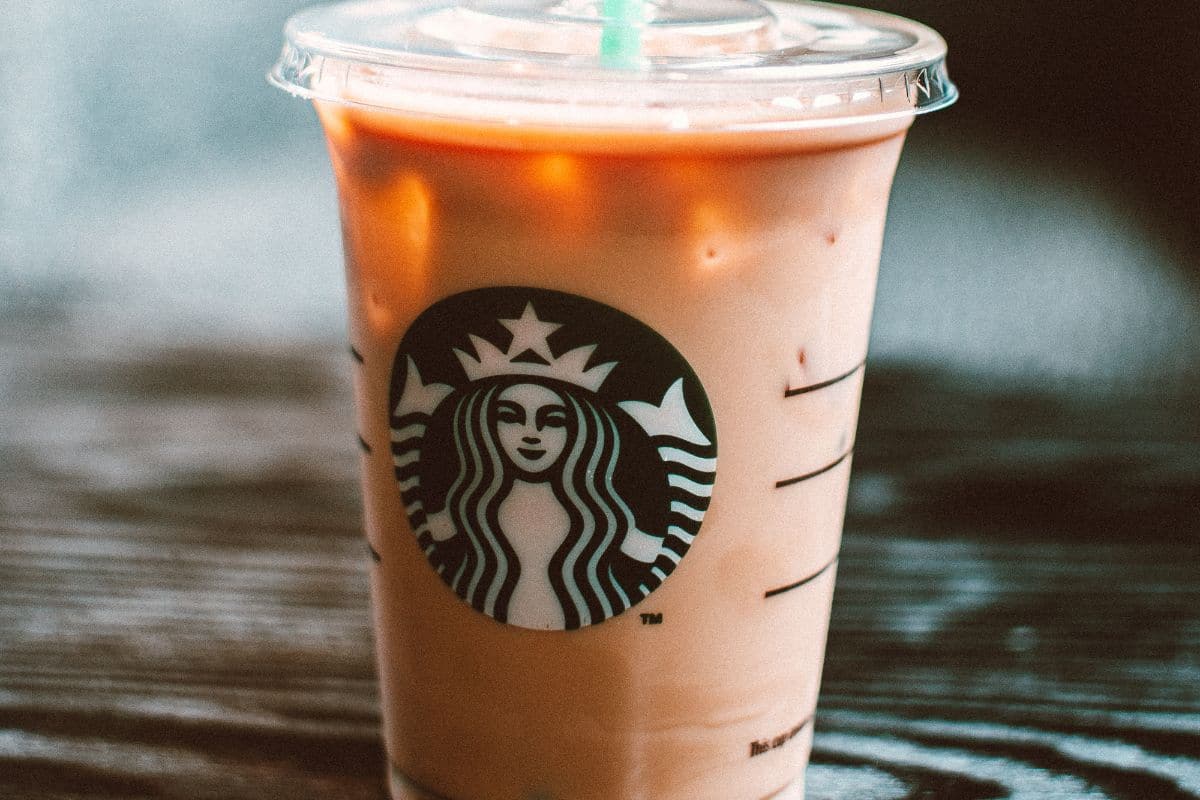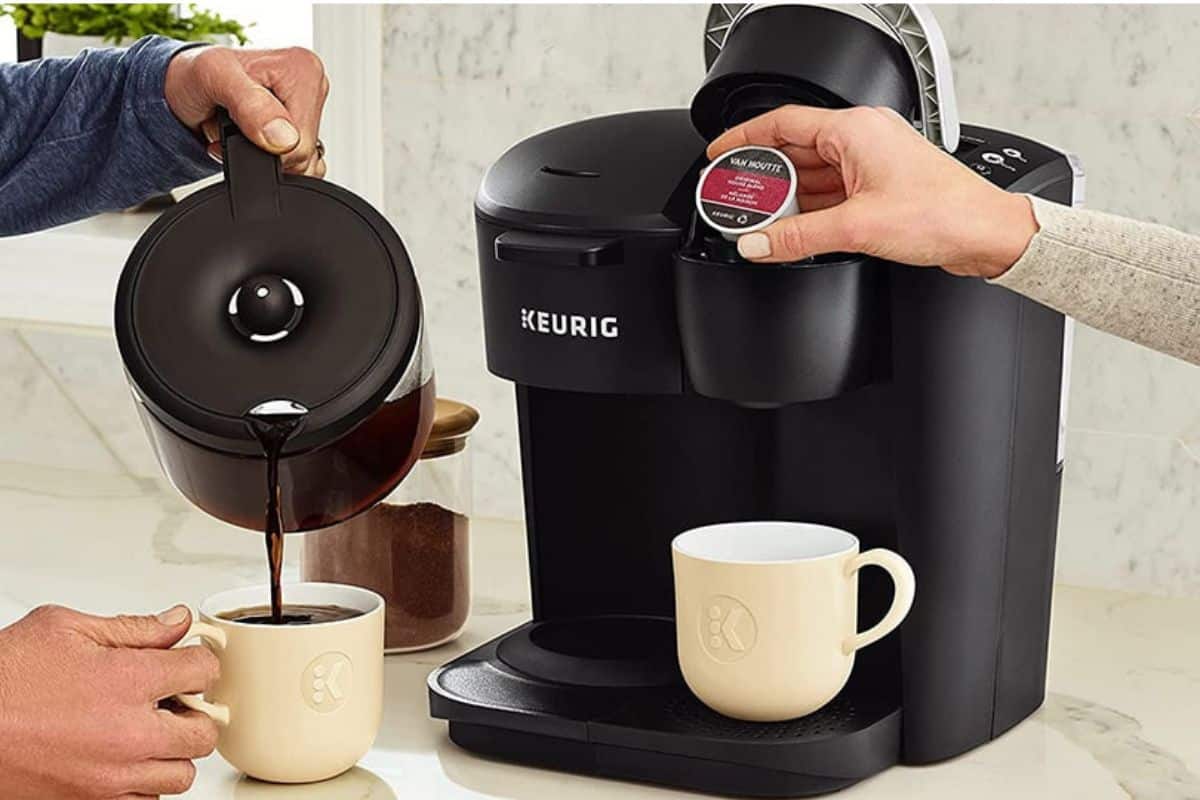A question about coffee which seems to come up a lot on online forums is whether adding milk to your coffee reduces, or even has any effect, on the caffeine content. At first I thought, surely not, but then does it react somehow? So I’ve done the research. Trust me, I’m a physicist.
Adding milk to your coffee does not reduce caffeine, If you add milk to a cup of coffee there is still just as much caffeine in the cup. Milk does not react with the coffee to reduce caffeine. It will dilute it though. So you will have less caffeine per ounce but just as much in the cup overall.
So adding milk doesn’t reduce the caffeine in the cup. What effect does milk have on our coffee and how can we control our caffeine intake?

Calories
Milk contains carbohydrates, fats, and proteins. All of these make up calories. A plain black coffee has almost zero calories to begin with (maybe around 4 calories). So by adding milk you’re introducing some calories.
Really not much though. Say you add a little splash of milk, call it 1 ounce (30ml), of whole milk; you have only added about 22 calories. Nothing to fuss over even if you’re counting your calories.
Does Adding Milk Lower Coffee Acidity?
Different sources online try to claim that milk will react with coffee to lower the pH. Claims vary between proteins and calcium causing milk to neutralise the coffee acid.
Well I’ve got to say I’m doubtful over the neutralization part. Mainly because milk has a pH of around 6.6 so it is slightly acidic itself.
Black coffee has a pH of around 5. So you will certainly still lower the pH by adding milk. Not through neutralization, but by plain good old fashoned dilution.
Does Adding Milk Cause Less Coffee Stains?
Coffee stains are caused by a compound in coffee called tanins. They give coffee its colour and also influence the flavor.
Supposedly, milk proteins will bind to these tanins and reduce the overall effect of staining on your teeth. Better yet, this is improved by higher fat concentrations in your coffee.
So whole milk will cause less stains than semi-skimmed or skimmed milk. Also, non-animal based milks don’t seem to really have this effect at all.
Does Adding Milk to Coffee Provide More Nutrients?
There are nutrients in black coffee. There are nutrients in milk. Put them together and what do you get? More nutrients!
It’s not like you will be getting your whole daily intake of any particular nutrient in one go here. Most are there in relatively small amounts.
For example, black coffee doesn’t really have much calcium, basically none. Adding 1 ounce (30ml) of milk introduces about 39mg of calcium, which milk is quite well known for. Your recommended daily amount of calcium is about 1000mg.
So you’re getting about 4% of your recommended calcium intake.
Milk Lowers The Temperature
Again, following the lines of the dilution. If you add some cold milk it will lower the temperature of your milk.
Drinking roasting hot coffee isn’t the best for you. It burns your mouth. Well, I suppose it’s a scald actually.
If you spill it, then you’re scalding yourself or others.
It’s safer. No one wants a burnt mouth. Or a burnt anything.
Antioxidants
Plain black coffee naturally contains antioxidants. These particular antioxidants are called polyphenols.
Adding milk has no effect whatsoever on the amount of antioxidants your body absorbs from the coffee. Although, interestingly, a non-dairy creamer will slow your antioxidant absorption but the same amount will eventually be absorbed.
Does Adding Water To Coffee Reduce Caffeine?
Just like adding milk, water will just dilute the amount of caffeine in the cup. You will have exactly the same amount of caffeine in the cup overall. Just less per sip.
How to reduce caffeine in coffee
So adding milk, or even water, doesn’t reduce the caffeine in the cup. How can I reduce the amount of caffeine in my mug o’ joe?
Use Less Coffee Grounds
When it comes down to it, the caffeine is coming from the coffee beans. If you use half as much coffee grounds, and dont change anything else, you have half as much caffeine in your coffee.
It’ll just taste a bit weaker.
Grind Size
If you took a chemistry class you’ll remember that a finer powder has more surface area. The more surface area, the more it can react.
If you grind your beans a bit coarser, you’ll get a mug with less caffeine.
A bit of a waste of coffee beans here in my opinion though. Maybe best just use a little less coffee in the first place. Your call.
Use a mix of decaf or all decaf
So you don’t like the sound of using less beans? Why not go half and half? No, not the milk, the beans!
Try using a mix of decaf beans and regular beans. You’ll get your own unique blend, less caffeine, and minimal compromise on taste!
Try different ratios to find what works for you. 1:1, 1:2, play around with it!
Reduce Brewing Time
If you speed up your brewing time, you’ve got less time for the caffeine to seep out of the bean and into the water.
It might sound weird, but imagine you make an espresso and a french press (cafetiere) with the same amount of the same beans which were ground exactly the same.
If you leave that cafetiere brewing there for ages it’s going to have much more caffeine in it than the espresso. The espresso is really fast to make.
I’m not saying necessarily opt for an espresso. Just get the beans out the water quicker.
Use Arabica Beans
There are two most common types of coffee beans. There are robusta and arabica.
Robusta beans have about twice as much caffeine as arabica.
Arabica beans taste much sweeter. They will have flavors of sugar, berries, and other fruits.
Robusta have a much darker, stronger, nuttier flavor to them.
Like a sweeter coffee and want less caffeine? Arabica could be your bean.
Try Cold Brew
Cold brew is a bit of a marmite of the coffee world. Love it or hate it.
Hipster or not; cold brew supposedly has less caffeine. About 30% less to be exact.
Which is weird because it takes a long time to brew. I suppose brewing it cold really reduces how much the caffeine seeps out into the water.
Either way, give cold brew a try. It can really grow on you. If you really don’t like it, you can warm it up.
Try a Smaller Serving
I do love a giant mug of bean juice.
While a massive mug is great, there is a lot of room for reducing your caffeine amount there. Often in my case, if I just go for a regular sized mug, I’ve probably halved the amount of caffeine I’m going to drink.
No compromise on flavour at all.
Are There Any Health Benefits to Adding Milk to Coffee?
I want to say there are not really any significant health benefits to adding milk to your coffee but things are never black and white. Yes, adding milk makes it extra delicious but that’s not what decides it. It totally depends what you’re going for.
Milk Lowers The Acidity
Like we talked about earlier, milk will lower the acidity. Mild controversy aside; if nothing else it will dilute it.
This is great if acid upsets your stomach. Acid reflux? Dilution is your solution!
Less acid is a plus for everyone’s teeth too. Can’t neglect your dental health.
Colder, So No Scalds
No one wants to be burned. Or scalded.
Whether it’s in your mouth or anywhere else there is just no need for the damage. Besides the pain, it can cause all kinds of problems.
Cool that brew down and little and you’re all clear.
What is The Best Type of Milk for Coffee?
Your choice of milk in your coffee is completely dependent on your diet and what you want nutritionally.
Overall, the type of milk you choose really doesn’t affect or negate any nutrients or health benefits from the black coffee itself. You’re just combining the coffee with a milk.
A non-dairy creamer is a common choice. You should be comfortable with it if you’re lactose intolerant but it still contains things like milk proteins and then a whole host of strange ingredients. Things like food colourings, preservatives. You could still react to it if you’re dairy-sensitive.
There are all kinds of milk substitutes that go great in coffee.
Soya milk is an age old classic but why not try oat milk? It is non-dairy, creamy, smooth, thick, and rich. It’s taste and texture and quite similar to full-fat whole dairy milk. It can even be steamed like regular dairy milk.
How much caffeine is in decaffeinated coffee?
Did you know there is still some caffeine in decaf coffee? The amount of caffeine is dependent on a lot of different factors.
It depends on,
- How the bean was grown
- How much caffeine was originally in the bean
- The decafeination process
- The roast process
To give an idea of numbers, USDA regulations say that a decaffeinated bean is to have 3% of its original caffeine content. That isn’t to say that a decaf cup of coffee has only 3% of the caffeine after brewing it.
When you actually brew your coffee, a small 8 ounce (236 ml) cup of decaf can have up to 7 mg of caffeine. Whereas a cup made with the same amount of similar beans, just not decaf, would have 70-140 mg of caffeine.
So, for a rule a thumb, It’s fair to say that the most caffeinated a decaf coffee will be is up to a tenth of the amount for a regular coffee.
How Much Caffeine is in a Regular Cup of Coffee?
While there can be 70-140 mg of caffeine in a regular 8 ounce small cup of coffee, the caffeine can vary wildly. It depends on the bean, the roast, brand, how it was brewed, and of course how big a cup you are drinking.
For starters, “one cup of coffee” can easily range anywhere between 1 ounce and 27 ounces (30 – 700 ml). This can put your caffeine content anywhere from 70 mg to well over 500 mg.
How Long Does Caffeine Stay in our Bodies?
The length of time caffeine stays in your body depends on a ridiculous number of factors. Everyone is different. Things like your level of fitness, age, even genetics can come into play here, just a name a few.
To say that caffeine lasts X amount of time in your body is an over simplifcation. That said, there are still numbers out there.
Firstly, it typically takes about 45 minutes to be absorbed into your body. So it does take some time to kick in.
When measuring chemicals or drugs in a body, the idea of a half life is usually used. A half life is the time for that drug to have decreased to exactly half of the original amount.
The half life of coffee is about 4 to 6 hours.
So if you drank 140 mg of caffeine, you can be pretty confident that after 6 hours, you have less than 70 mg remaining in your body. After another 6 hours, there is less than 35 mg.
When it comes down to it, finding the right amount of caffeine will take some experimenting. It entirely depends on you. Play around with it but most importantly make sure you enjoy your coffee.
Related Reading





